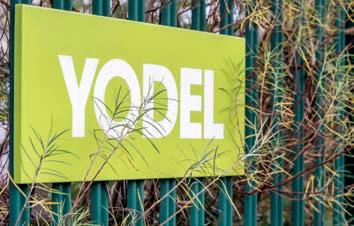
4 minute read
PM plays skills blame game
Union praises Yodel for backing down in LGV pay dispute
The GMB union has praised Yodel for “doing the right thing” and offering staff a pay increase that will see LGV drivers receive £16 per hour.
Advertisement
The move comes after stormy negotiations saw 95% of members vote to take industrial action, threatening the supply chains of some of the UK’s biggest retailers, including M&S and Aldi.
The union is still in discussions over some outstanding issues including the settlement of an employment tribunal affecting 137 employees, which Yodel has agreed in principle to resolve.
“This is a great outcome for our LGV1 drivers at Yodel who before this earned some of the
Photo: Shutterstock
worst wages and endure less than satisfactory working conditions,” said GMB national officer Nadine Houghton.
“By standing strong and together, GMB members have held Yodel to account and helped the company realise the true worth of LGV drivers.
“It took some time, but Yodel did the right thing and agreed to the pay rise. Our members will now vote on the new offer and strike action may yet be avoided.
“If anyone ever doubted the worth of being in a union, they need only read this story.” n Yodel is looking to recruit 4,311 staff as it
prepares for the peak season and a further surge in online shopping. The roles are across the company’s 50 depots and include couriers, parcel sorters and warehouse operatives.
‘Government policies, not industry’ responsible for driver shortages
Sector hits out at PM’s blame game
By Carol Millett
Haulage operators have accused the Prime Minister of attempting to scapegoat the industry for the petrol pump crisis after failing to heed their warnings of a serious supply chain issues months ago.
The industry criticism follows comments made by Boris Johnson on the BBC’s Andrew Marr Show earlier this month. He said that for “decades” the haulage industry “was not investing in the truck stops, not improving conditions, not improving pay.
“We relied on very hard-working people who were willing to come in largely from European Accession countries to do that work under those conditions,” he said.
Steve Granite, Abbey Logistics chief executive (pictured right), was one of several hauliers to reject Johnson’s claims. “It is a tactic to deflect the blame onto the sector and it is infuriating,” he said.
“The driver shortage is a result of Brexit, which lost us over 10,000 drivers, combined with the delays to the HGV driving tests during Covid-19, which lost us another 30,000 drivers and the government’s IR35 tax rule changes, which also lost us many European drivers who could no longer operate as limited companies.
“We have increased our pay rates by double digits and brought in better facilities and conditions for our drivers, but there are not enough drivers out there to meet demand. The government has to put drivers on the skills shortage list. They have to accept that their immigration policy since Brexit does not match the needs of the UK economy.”
Meanwhile, The RHA has given a cautious welcome to the government’s decision to set up an industry taskforce to advise on the UK’s supply chain crisis led by former Tesco chief Sir David Lewis. However, they warned that ministers must not use it as a “smokescreen” to hide a lack of action.

Hoyer UK reports huge interest in tanker driver roles
Hoyer UK has taken on additional staff to process the flood of applications it has received from people wanting to work as tanker drivers, following the petrol pump crisis.
The company is seeking around 50 drivers and had been struggling to fill the vacancies. The fuel haulage sector as a whole is estimated to be short of approximately 500 tanker drivers.
A spokeswoman said: “We have had a huge volume of applicants, so much so that we have had to take on extra HR staff as we are so overloaded.”
She added that the crisis has also highlighted the pay levels of tanker drivers, which have risen in the sector as demand continues to outstrip supply, with some being paid over £50,000 a year.
Suckling looks forward after pandemic woes
Turnover at Suckling Transport fell by £9.4m last year due to a reduced demand for road fuels, coupled with a partial reduction in long-term contractual business.
In its latest results, the Essexbased haulage contractor said prompt decision-making regarding resource levels, significant cost controls and reliance on the furlough scheme ensured the pandemic had a limited impact on its business.
Pre-tax profit for the year ending 31 December 2020 reduced by 76.9% to £283,000.
The company said that despite the challenges, it had been able to widen its customer base and increased revenue with a key customer.
It also managed to boost growth and customer take-up in its wider customer service offering, such as order taking, scheduling and stock management.
Suckling said: “With stringent control and close monitoring, the cash position for the business remained strong during 2020 with no requirements for external funding.
“The company continued to invest in new vehicles and trailers during the year to ensure we maintain a modern and efficient fleet with the latest safety features.
“The trading outlook for 2021 appears positive as Covid-19 restrictions begin to be lifted and volumes start to improve and the company is well positioned to respond to these improving market conditions.”


